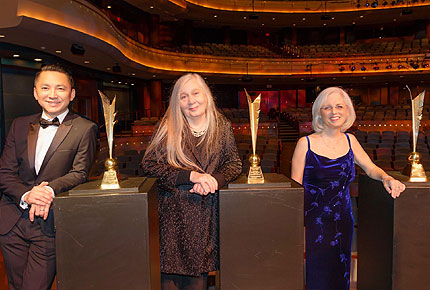Marilynne Robinson – she of the incandescent, Pulitzer-winning prose – wasn’t thinking about her celebrated fiction last month, even though she took clear pleasure recalling its pull in 2015 bringing President Barack Obama to Iowa to interview her. Instead, the winner of Lifetime Achievement from the Dayton Literary Peace Prize dwelt last month on her 1989 nonfiction Mother Country.
“I can report that I’ve been sued only once – and that for a book about nuclear waste disposal by the United Kingdom that makes the Irish Sea the most radioactive water in the world,” she told a Dayton audience about Mother Country. “If I wrote only one book — that would be the one.”
Observing that “my fiction and nonfiction come from different parts of my head,” Robinson smiled wryly, her cascade of white-gold hair giving her the aura of a prophet. At 73, she wielded gravitas on a panel of literary stars. She asserted that war crimes and environmental assaults were evils that get buried in willful acts of not-knowing:
“There are things we choose not to know that are absolutely as dangerous and destructive as what we think we know,” she told some 300 listeners at Sinclair Community College in downtown Dayton.
The Dayton Literary Peace Prize – established to commemorate the accords that ended the Bosnian War – has honored 60 writers in its 11 years. “The secret to peace threads through all of them,” said Sharon Rab, founder and co-chair. “These books have fine-tuned my sense of what is acceptable, and, more importantly, what is not acceptable.”
Anisfield-Wolf Book Awards winners have received the Dayton prize seven times, illustrating a convergence between equity and peace: Taylor Branch, Edwidge Danticat, Junot Diaz, Louise Erdrich, Marlon James, Chang-Rae Lee and Andrew Solomon.
And the most recent lineup of authors gathered in November under a slate gray Dayton sky, exemplified some of the best work in contemporary letters.
“As a realist, I don’t believe in peace; as an idealist, I have to believe in it,” noted Viet Thanh Nguyen, honored for The Sympathizer, a political novel whose narrator spied for both sides in the Vietnam War. By squaring up to atrocity, Nguyen argues, “we can also imagine the best that humanity is capable of, and in that way provide a vision, a way to overcome the momentum of past conflicts and inherited bitterness, the inertia of accepting our brutality. A strong dose of unsentimental realism, mixed with a touch of wild idealism – that is one way to imagine what I attempted” in The Sympathizer.
Banned in Vietnam, the novel is being taken up by some U.S. military academies. “The significance of the Vietnam War is it is one more episode of perpetual war that the United States is engaged in,” Nguyen said. “This is something that Americans must confront.”
James Hannaham, runner-up for the Dayton fiction prize for Delicious Foods, told the audience that his uncle, an art professor “has a motto I’ve internalized: Fear No Art. I’m always gravitating to those things I’m afraid of.”
Indeed, crack cocaine has a major role in Delicious Foods. As Hannaham read literature “attempting to deal with the legacy of slavery,” he found “these books would set the story in the past. At some point I realized I didn’t have to do that, and it seemed to be a way to make a significant contribution to the genre.”
Although he gave a copy of his novel to filmmaker Ava DuVernay, Hannaham said he isn’t particularly drawn to Hollywood. “One of the miracles of fiction is the thing can get made,” he said. “It’s artisanal. You sit alone in a room with your thoughts. . . No one is telling you what they think 14-year-old white boys want to see.”
Rab, who works to bering peace prize books into classrooms and conversation, said the nonprofit is adding a new wrinkle this winter: a chance for stakeholders to help rebuilt the National Library at Sarajevo in Bosnia, which was firebombed during the war. More than two million books were destroyed. The peace prize’s “Fly With the Doves Book Circle” donates a new book to rebuilding Sarajevo’s collection for every $25 contributed on the website.
“We plan to send a complete set of DLPP award-winning books to Bosnia as our gift to them,” Rab said.
Wil Haygood, who thoughtfully guided the writers’ presentations, said his travels had given him a sense of the sacredness of books, including during the conflict in Somalia, where he witnessed boys and men risking their lives to hide and save them.
“During our own Civil War,” Haygood said, “Abraham Lincoln gave instructions to his military leaders: Keep as many libraries open as you can. . . Not every place did, but even in the midst of war, many were.”
